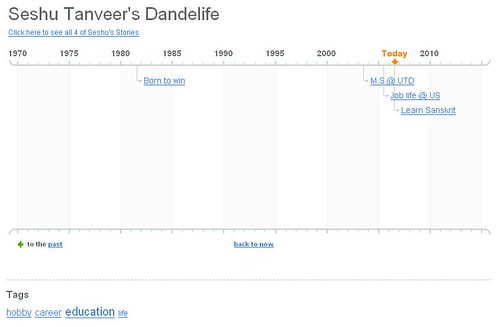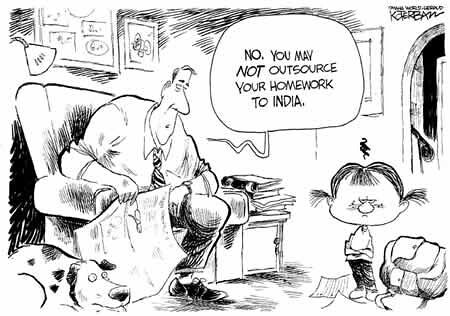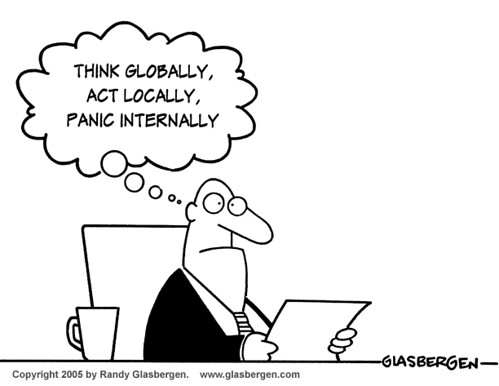Below are four (4 ) questions and a bonus question. You have to answer them instantly. You can't take your time, answer all of them immediately. OK?
Let's find out just how clever you really are.
First Question:
Y ou are participating in a race You overtake the second person. What position are you in?
.
.
.
Answer: If you answered that you are first, then you are absolutely wrong! If you overtake the second person and you take his place, you are second! (Select the text to see the answer)
Try not to screw up in the next question.
To answer the second question, don't take as much time as you took for the first question.
Second Question:
If you overtake the last person, then you are...?
.
.
.
Answer: If you answered that you are second to last, then you are wrong again. Tell me, how can you overtake the LAST Person? (Select the text to see the answer)
You're not very good at this! Are you?
Third Question: Very tricky math! Note: This must be done in your head only. Do NOT use paper and pencil or a calculator. Try it.
Take 1000 and add 40 to it. Now add another 1000. Now add 30. Add another 1000. Now add 20. Now add another 1000 Now add 10. What is the total?
.
.
.
Did you get 5000 ?
.
.
.
The correct answer is actually 4100. (Select the text to see the answer)
Don't believe it? Check with your calculator! Today is definitely not your day. Maybe you will get the last question right?
Fourth Question:
Mary's father has five daughters: 1. Nana, 2. Nene, 3. Nini, 4. Nono.
What is the name of the fifth daughter?
.
.
.
Answer: Nunu?
No! Of course not. Her name is Mary (Select the text to see the answer)
Read the question again
Okay, now the bonus round:
There is a mute person who wants to buy a toothbrush. By imitating the action of brushing one's teeth he successfully expresses himself to the shopkeeper and the purchase is done.
Now if there is a blind man who wishes to buy a pair of sunglasses, how should he express himself?
.
.
.
He just has to open his mouth and ask, so simple. (Select the text to see the answer)
KEEP THIS GOING TO FRUSTRATE THE SMART PEOPLE IN YOUR LIFE!
July 30, 2006
Frustrate the smart people
July 29, 2006
One-laptop-per-child... Not required!
I consider India's decision to opt out from the OLPC program as a wise one. OLPC is a programme which aims to deliver laptops priced at $100 (about Rs.4500) to school students, according to reports. Here is what is said by Sudeep Banerjee of Indian Human Resource Development...
- OLPC is a “pedagogically suspect”. He elaborated on it by mentioning that laptop may actually be detrimental to the growth of creative and analytical abilities of the child.
- The ministry cannot visualize a situation for decades when we can go beyond the pilot stage. We need classrooms and teachers more urgently than fancy tools.
- If the Planning Commission has the kind of money that would be required for this scheme, it would be appropriate to utilize it for ‘Universalisation of Secondary Education’ for which, a concept paper has been lying with the Planning Commission for approval since November 2005.
- We do not think that the idea of Prof Negroponte is mature enough to be taken seriously at this stage and no major country is presently following this. Even inside America, there is no much enthusiasm about this.
If one thinks of it in practical terms, most of the above (except the first point) make sense. Here are my thoughts on it...
I contradict the HRD's reference to laptops as "pedagogically suspect". Laptops actually entertain the expression of creativity in students. It gives them more ways to express, communicate, and sell their ideas. However, I agree with the HRD on all other points. India has taken the mission to fight illiteracy, which is dominantly seen in rural areas. What it desperately need are more schools, teachers, and a basic infrastructure. Laptops need not get into the picture now.... not so soon.
Standalone laptops without an internet connection will prove to be a less powerful tool. But, an internet connection will spice up the cost of maintenance for people in rural areas. Here is yet another strong reason for my argument... The Indian education system did not yet incorporate computers into its normal teaching process. There is no online submission policy or e-notes. So, the use of laptops at schools is pushed further down.
First of all we should make sure that the program works, before investing huge sum of money on it. Its like reading customer-reviews before purchasing a product. Check this article that questions if OLPC is fundamentally flawed. Bottomline is that it is too soon for India to take up OLPC program, and its a wise decision by the HRD to snub it for the time being.
Also check out this blog-post in which the author has stated some of his views on India's decision to against OLPC. Its a good read.
July 28, 2006
Happiest people live in Denmark
I read a couple of articles that ranked the world's happiest countries. Nigeria was given the top spot in 2003. The most recent ranked list is the one put together by 'University of Leicester' on July 2006. Click here for the complete list of ranking, and an interactive world map that paints each nation based on its level of happiness.
The 10 happiest nations in the World are:
1. Denmark
2. Switzerland
3. Austria
4. Iceland
5. The Bahamas
6. Finland
7. Sweden
8. Bhutan
9. Brunei
10. Canada
Other notable results include:
23. USA
35. Germany
41. UK
62. France
82. China
90. Japan
125. India
167. Russia
The three least happy countries were:
176. Democratic Republic of the Congo
177. Zimbabwe
178. Burundi
Interestingly, Nigeria is not among the top 10... I was wondering what pushed India to be unhappier than most of its neighbours. In theory, it should be the other way round.
- India's average household income has been increasing at a rapid pace ever since the birth of off-shoring.
- Moreover, Indians have the innate quality to show contentment for whatever they have, irrespective of their financial/social status.
- The ability to work hard & smart have been given to Indians even before they could ask for.
- Its society and culture encourage the teens to live with their parents, and enjoy the luxuries of love & affection at home everyday.
Then, why else are we Indians not as happy as expected? Here are my thoughts on it...
- Influence by the West... The desire to live a western lifestyle in India
- Joint-family problems (within large families)
- Increased competation in every aspect of life due to large population
- Mediocre household-income to most families
- Stress among students to study harder and harder, irrespective of their interests
- Government infrastructure is not among the best
- Poverty
- Jealousy (not specific to India)
Is there a way out? Check out this article that explains how to overcome unhappiness through study. If you are lazy to read it, here is a shortcut... As wise men say: "whatever happens, happens for good". Lets all believe in this adage, and be happy for life.
July 27, 2006
India-US Nuke deal
The India-US Nuclear deal will be a landmark to India's bi-lateral relationship with US. This will let India to better utilize the technology, potential, and resources. Whatz the clause...? It has to place two-thirds of its existing and planned civil nuclear reactors under the supervision of the International Atomic Energy Agency, in exchange for civil nuclear commerce with the United States.
Here are few of the factors that aided India to bag the deal...
- The reputation of India as a peace-loving nation put her in good pages of US. There is a firm belief that India would continue to remain the same irrespective of her power and technology.
- In the recent years, India has played a crucial role in world politics, and improved its American bi-lateral relationship. The experts state "India is just too important for America", and expects the deal to be implemented on a fast track.
- The Indian American community did whatever they could... "We are the largest contributer (among) ethnic groups in the US. So our voice in Capitol Hill is very huge," said Supriya Christopher, executive director of USINPAC.
Now, the Indian government is working hard to convince the Left for this Nuke deal. Check out this article for more details. Doubtlessly, there are a few trade-offs to be made... In my opinion, the end result serves more purpose and is vital for a long term growth. This reminds me of the liberalization of social reforms by India in 1991. Opening the Indian gates to welcome foreign products was a big step for India in the light of globalization. Those bold moves in the past despite criticism paid off in creating a rapidly developing India as it is today... Similarly, this nuke deal will break the barriers faced by Indian scientists to make advancements in civil energy production. We will realize how much good came from this deal in the coming years.
July 26, 2006
How to live the right way
Here are my thoughts (20 of them) on how to live life, and make my life interesting... Supposedly a fraction of infinite possible ways to stand out of the dull routine life...
- Take (atleast) one good principle in life, and stick to that one principle for all your life... whatever be the odds you have to face.
- Create a lifestyle of your own (eg. Buy only reputed/branded products, Do not buy used stuff, ...)
- Have an iconic behavior & style (i.e.) Get inspired by others, but do not immitate others in terms of behavior and style.
- Set your priorities right... and be clear about it.
- Pick your favorites, and have a choice-list of your own. Do not just go by the defaults, or the cheapest... Most of us have our preferences with food and clothing, but take the defaults for others.
- Be consistent in your decisions.
- Gather your thoughts on the following question, and set your actions accordingly... Why are we all here on this planet? and what are our duties during our stay?
- Make your share of contribution to the society... Let it be in the form of donations, or service.
- Set your long term career goals and strive for it relentlessly (usually on weekends)
- Once in a while (if not everyday), practice concentration and stress-relief techniques to sharpen your cognitive process. Some call it meditation...
- Exercise everyday... do not yield to lethargy.
- Treasure your memories. Have a log of important events of your life (in the form of a personal diary, or a blog site). The greatest contentment is to see yourself grow, and become what you want to become.
- Learn some new stuff everyday... In the very least, learn a new word or read a new quote. There are several RSS feeds to help us with that.
- Helping others is meritorious, and harming others is sinful. Help ever, hurt never... Live, and let live. For all non-vegetarians, this is something to think about...
- Never look at the future with the eyes of fear; Be a hero; Always say "I have no fear". As said in the past, face your fears.
- Love your parents, and make them feel proud of you. After all, they are the reason why you are here.
- Know all, and Specialize one. This does not mean to be a jack of all trades. One should be able to talk about several diversified topics for a minute or two. Hmmm! Wikipedia comes in handy...
- Update yourself with the changing times... Change is permanent. As stuff around us change, we need to reset our priorities, principles and life-style.
- Be a man of your words... That'd be the greatest challenge you could ever take... So, take it!
- Life is short and sweet... Do something that will be remembered for many years to come (even in your absense)... Let your life be a legend for the future.
July 23, 2006
Can U beat this Resume?
RESUME
EDUCATION /Qualification:
1950: Stood first in BA (Hons), Economics, Punjab University, Chandigarh,
1952; Stood first in MA (Economics), Panjab University, Chandigarh,
1954; Wright's Prize for distinguished performance at St John's College,Cambridge,
1955 and 1957; Wrenbury scholar, University of Cambridge,
1957; DPhil (Oxford), DLitt (Honoris Causa); PhD thesis on India's export competitiveness
OCCUPATION /Teaching Experience:
Professor (Senior lecturer, Economics, 1957-59;
Reader, Economics, 1959-63;
Professor, Economics, Panjab University, Chandigarh, 1963-65;
Professor, International Trade, Delhi School of Economics,University of Delhi, 1969-71;
Honorary professor, Jawaharlal Nehru University,New Delhi, 1976 and Delhi School of Economics, University of Delhi,1996
Civil Servant
Working Experience/ POSITIONS:
1971-72: Economic advisor, ministry of foreign trade
1972-76: Chief economic advisor, ministry of finance
1976-80: Director, Reserve Bank of India; Director, Industrial Development Bank of India;
Alternate governor for India, Board of governors, Asian Development Bank, IBRD;
November 1976 - April 1980: Secretary, ministry of finance (Department of economic affairs);
Member, finance, Atomic Energy Commission; Member,finance, Space Commission
April 1980 - September 15, 1982: Member-secretary, Planning Commission
1980-83: Chairman, India Committee of the Indo-Japan joint study committee
September 16, 1982 - January 14, 1985: Governor, Reserve Bank of India.
1982-85: Alternate Governor for India, Board of governors, International Monetary Fund
1983-84: Member, economic advisory council to the Prime Minister
1985: President, Indian Economic Association
January 15, 1985 - July 31, 1987: Deputy Chairman, Planning Commission
August 1, 1987 - November 10, 19! 90: Secretary-general and commissioner, south commission, Geneva
December 10, 1990 - March 14, 1991: Advisor to the Prime Minister on economic affairs
March 15, 1991 - June 20, 1991: Chairman, UGC
June 21, 1991 - May 15, 1996: Union finance minister
October 1991: Elected to Rajya Sabha from Assam on Congress ticket
June 1995: Re-elected to Rajya Sabha
1996 onwards: Member, Consultative Committee for the ministry of finance
August 1, 1996 - December 4, 1997: Chairman, Parliamentary standing committee on commerce
March 21, 1998 onwards: Leader of the Opposition, Rajya Sabha
June 5, 1998 onwards: Member, committee on finance
August 13, 1998 onwards: Member, committee on rules
Aug 1998-2001: Member, committee of privileges 2000 onwards: Member, executive committee, Indian parliamentary group
June 2001: Re-elected to Rajya Sabha
Aug 2001 onwards: Member, general purposes committee
BOOKS:
India's Export Trends and Prospects for Self-Sustained Growth -Clarendon Press, Oxford University, 1964;
Also published a large number of articles in various economic journals.
OTHER ACCOMPLISHMENTS:
Adam Smith Prize, University of Cambridge, 1956
Padma Vibhushan, 1987
Euro money Award, Finance Minister of the Year, 1993;
Asia money Award, Finance Minister of the Year for Asia, 1993 and 1994
INTERNATIONAL ASSIGNMENTS:
1966: Economic Affairs Officer
1966-69: Chief, financing for trade section, UNCTAD
1972-74: Deputy for India in IMF Committee of Twenty on International Monetary Reform
1977-79: Indian delegation to Aid-India Consortium Meetings
1980-82: Indo-Soviet joint planning group meeting
1982: Indo-Soviet monitoring group meeting
1993: Commonwealth Heads of Government Meeting Cyprus 1993: Human Rights World Conference, Vienna
RECREATION
Gymkhana Club, New Delhi; Life Member, India International Centre, New Delhi
PERSONAL DETAILS
Name: Dr Manmohan Singh
DOB: September 26, 1932
Place of Birth: Gah (West Punjab)
Father: S. Gurmukh Singh
Mother: Mrs Amrit Kaur
Married on: September 14, 1958
Wife: Mrs Gursharan Kaur
Children: Three daughters
Our (Indian) Prime Minister seems to be the most qualified PM in the history of India... (not sure about the world).
July 17, 2006
US Textbooks teach biased view of Hinduism
It was found that the US school books contain factual inaccuracies, distortions, bias, prejudice and personal opinion about Hinduism and the history of India. Here is the quote by Dr. Rakesh Bahadur: "One day my daughter came home and said, 'Daddy, what you teach us about Hinduism is wrong'".
Check out this article for the complete story. US is a nation of immigrants... and a bias of this sought is very unfair and shameful to the nation. This has also been reported in 'The Washington Post', and here is an excerpt...
Balaji Hebbar, a George Washington University religion professor who was one of three scholars hired by Fairfax County to review the books cited by the group of Indian parents, said he and his colleagues found few factual errors. But he said the lessons boiled down a complex culture to "karma, cows and caste."
"It's as if I were making a picture book of the United States, and I took pictures of the bad parts of D.C., the run-down parts of New York City and the smoke stacks of Cleveland and left out the Golden Gate Bridge and the Statue of Liberty," Hebbar said. "I would be telling the truth, but I would only be telling half the truth."
July 15, 2006
Thinking of Daddy
A good article that I came across...
HOW A SON/DAUGHTER THINKS OF HIS/HER DADDY AT DIFFERENT AGES:
At 4 Years
My daddy is great.
At 6 Years
My daddy knows everybody.
At 10 Years
My daddy is good but is short tempered
At 12 Years
My daddy was very nice to me when I was young .
At 14 Years
My daddy is getting fastidious.
At 16 Years
My daddy is not in line with the current times.
At 18 Years
My daddy is becoming increasingly cranky.
At 20 Years
Oh! Its becoming difficult to tolerate daddy. Wonder how Mother puts up
with him.
At 25 Years
Daddy is objecting to everything.
At 35 Years
It's becoming difficult to manage my son. I was so scared of my father
when I was young.
At 40 Years
Daddy brought me up with so much discipline. Even I should do the same.
At 45 Years
I am baffled as to how my daddy brought us up.
At 50 Years
My daddy faced so many hardships to bring us up. I am unable to manage a
single son.
At 55 Years
My daddy was so far sighted and planned so many things for us. He is one
of his kind and unique.
At 60 Years
My daddy is great.
Thus, it took 56 years to complete the cycle and come back to the 1st.stage. Realize the true value of your parents before it's too late
July 14, 2006
Your life at a glance
I visited the web2.0 site DandeLife soon after reading the review at TechCrunch. This is the kind of webapp that I was ambitious of creating it myself. However, I noticed some of the key features missing in it, and hope to see them soon. One of them is the scroll button to view stories of the future (beyond the year 2010) so that it can be used for long term planning. The other one is to display stories in different layouts. But in general, the interface is clean and simple... and the concept is good.
Here is a view of my dandelife...

July 11, 2006
Guru Poornima
Today is a very sacred day... Its Guru Poornami. Guru refers to our master who removes the fundamental ignorance, and enlightens our lives. The poornima is the full moon day, and it has been fixed for revering him. Today is the day of the year we honour sage Vyasa, who set down in writing the Vedas which previously were known only in the form of sound. Check this article that explains Guru Poornima in a very consise and a informative manner. Here is an excerpt from it...
This is a sacred day. It is the day when we honour Sage Vyasa, who gave mankind the precious gem of Saguna worship ( worship of God with Form) and the hope and assurance that Manava (man) can become Madhava (God), that Nara can become Narayana, that Jeeva can become Brahman,... ... ... # Vyasa was a great Rishi (sage). He is described as an incamation of Lord Narayana. He set down in writing the Vedas which previously were known only in the form of sound. He was the great grandson of Arundhati (wife of Vasishta). He codified the Vedas. As he was born on the full moon day in the month of Aashaada, this day is celebrated as Vyasa-poornima. Vyasa glorified the divinity that is equally present in all human beings and propagated this truth to the world. After writing the eighteen puranas, he summed up their message in one line : "Paropakaraha Punyaya, Paapaaya Parapeedanam"(Helping others is meritorious harming other is sinful). "Help ever, hurt never". Vyasa was the great teacher who gave many profound and sacred truths to mankind. Hence his birthday is celebrated as Guru Poornima.
July 10, 2006
July 02, 2006
Learning Sanskrit
I came across an article in Wikipedia titled "Contribution of Vedic Civilization". It explains to us some of the ancient Indian Vedic knowledge, and how it relates to the modern world. One of the impressive topics in this article is the research/experiment "Scientific research on Reading the Vedic literature at MUM" conducted by Travis F.T., Olsen T., Egenes T., & Gupta H.K. This research proved that reading Sanskrit does more good to human health than many other modern languages. Here is an excerpt...
Scientific research on Reading the Vedic literature at MUM
Travis, F.T., Olsen, T., Egenes, T., & Gupta, H.K. (2001).
Physiological patterns during practice of the Transcendental Meditation Technique compared with patterns while reading Sanskrit and a modern language.
International Journal of Neuroscience, 109, 71-80.
This study tested the prediction that reading Vedic Sanskrit texts, without knowledge of their meaning, produces a distinct physiological state. We measured EEG, breath rate, heart rate, and skin conductance during: (1) 15-min Transcendental Meditation (TM) practice; (2) 15-min reading verses of the Bhagavad Gita in Sanskrit; and (3) 15-min reading the same verses translated in German, Spanish, or French. The two reading conditions were randomly counterbalanced, and subjects filled out experience forms between each block to reduce carryover effects. Skin conductance levels significantly decreased during both reading Sanskrit and TM practice, and increased slightly during reading a modern language. Alpha power and coherence were significantly higher when reading Sanskrit and during TM practice, compared to reading modern languages. Similar physiological patterns when reading Sanskrit and during practice of the TM technique suggests that the state gained during TM practice may be integrated with active mental processes by reading Sanskrit.
Today I started learning Sanskrit from the book titled "Introduction to Sanskrit, Part 1" written by Thomas Egenes. I purchased the book last week, after browsing through the good reviews in Amazon.com. In my earlier blog-post, I mentioned my desire to learn this language.... and today, I am putting it to action.
 Bookmark
Bookmark 








